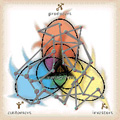Navigating in a Networked Economy: Value Webs Reach a Tipping Point
/"A network economy does not think in supply chain terms or in departmental boxes. It thinks and acts as a web of ideas, people, processes, markets, tools, environments. The parts and the whole grow stronger together. Threads weave together, forming new patterns, new connections, new capabilities. Producers, customers, and investors design, invent, build, market and sell as an ecosystem.
"Co-creation replaces the linear way of thinking and doing where each part gets it 'right' and passes it to the next part to get it 'right' who passes it on and so forth. ValueWeb communities work concurrently, changing 'hats' where appropriate, competing, cooperating ... constantly evolving to bring higher order solutions, people, and opportunities into the web." - Gail Taylor, 1998
 A decade ago I was introduced to a conceptual model of the networked enterprise that is now referred to as the "Value Web" model. Matt Taylor had been actively working with it and introducing it to MG Taylor clients since the 80's, but for the first time, executives and organizational leaders were beginning to embrace it. Today, in a world more fully immersed in the flows and fluidities of the networked economy, value web-like structures are becoming a mainstream means of organizing and getting things done. In the ongoing evolution and learning of how we organize and work together, this way of working is gaining fitness fast.
A decade ago I was introduced to a conceptual model of the networked enterprise that is now referred to as the "Value Web" model. Matt Taylor had been actively working with it and introducing it to MG Taylor clients since the 80's, but for the first time, executives and organizational leaders were beginning to embrace it. Today, in a world more fully immersed in the flows and fluidities of the networked economy, value web-like structures are becoming a mainstream means of organizing and getting things done. In the ongoing evolution and learning of how we organize and work together, this way of working is gaining fitness fast.
In essence, what I am suggesting here is that the idea of a "value web" has, after multiple tries – with each result feeding back into and changing the idea – escaped to a higher order. Whether its with the well-known, well-chronicled Big Ideas such as Open Source, P2P and Web 2.0, or any of a vast array of less publicized but equally compelling experiments, value webs have moved from "model" to "paradigm" – a new way of seeing reality.
Thinking about it in terms of Thomas Gilbert's Vantage Points, the idea of a "network economy" and "networked organization" has, over the past decade, crept up from tactics into strategy, and seeped down from academic oration into operational philosophy. What we are getting now is a shift in culture and policy. As it is these vantage points that dominate our day-to-day experience of the world, I believe that this shift will produce changes more easily recognized and felt than previous shifts in the coming-to-knowing of a network economy.
A key to the success of this shift will be the ability of established and emergent organizations to embrace, nurture and support the culture that wants to emerge. This not an easy endeavor. All too common are organizations in which policy and culture are, to put it mildly, adversarial. The care and feeding of a value web community is different than that of both traditional command-and-control organizations and laissez-faire loosely connected social networks. How many organizations will have the radical trust required to fully realize this transition? Tomorrow Makers has been working with a couple of network-based organizations that, over the past several months, have made noteworthy strides in this regard.
The Value Web is a newly-forming structure of long associated independent knowledge workers steeped in MG Taylor methodologies. As the name implies, this community is attempting to embed a value web framework as the core of its being. Made up of a broad and diverse range of talent residing throughout western Europe and North America, The Value Web is flocking towards legal recognition as a standards bearing, benefits granting, dues collecting association for the purpose of "practicing a new way of working ... to consolidate, increase, promote, and disseminate knowledge and intellectual property relating to transformative change based on the MG Taylor method and process."
A second value-webbish organization that Tomorrow Makers has seen awaken this year is Dreamfish, a configuration of 'changemakers' united in their dedication to creating a more just, sustainable, and healthy world through their work. Dreamfish is a superb illustration of "the parts and the whole (growing) stronger together... forming new patterns, new connections, new capabilities. Producers, customers, and investors design, invent, build, market and sell as an ecosystem."
While it is unquestionable that information technologies - chiefly, Internet related technology - have been the primary drivers and enablers of the network economy's emergence, I believe that we have entered a period in which innovations in how we organize, work together, and make decisions as humans will lead to fundamentally different ways of seeing and being in the world.

